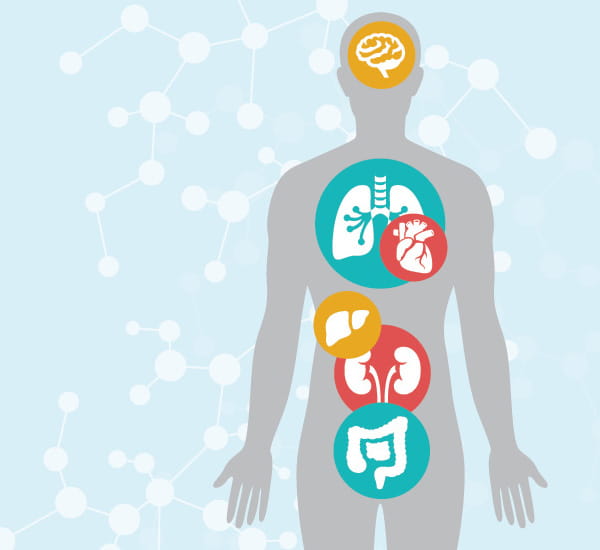Lynch syndrome
A change in certain genes is associated with Lynch syndrome, which can increase your risk of developing some cancers.
What is Lynch syndrome?
Lynch syndrome is an inherited condition. When you have a change in the MLH1, MSH2, MSH6 or PMS2 genes, it can lead to an increased risk of developing certain cancers, including:- Colon cancer
- Ovarian cancer
- Uterine cancer
MLH1 gene change
The MLH1 gene is a "mismatch repair gene," meaning it helps cells repair mistakes in your DNA. When this gene isn’t working like it should, errors can add up in the DNA of cells in different parts of the body. And this leads to an increased risk of developing certain types of cancer.
Understanding your risk
Colon, uterine and ovarian cancers are the main cancers associated with Lynch syndrome. However, it’s possible to have Lynch syndrome and never develop any of them.
If you have Lynch syndrome, cancer screening with colonoscopy is recommended starting at age 25. With appropriate screening and management, many cancers can be prevented or detected at an early, treatable stage. And having knowledge of your higher cancer risk will help you and your doctors develop an action plan that’s right for you.
Risk in the general population
- Colon cancer: 5.5%
- Uterine cancer: 2.7%
- Ovarian cancer: 1.3%
- Sebaceous neoplasm: <1%
- Pancreatic cancer: <1%
- Stomach cancer: <1%
- Other: brain, small bowel, hepatobiliary and urinary tract cancer: <1%
Risk with MLH1 gene change
- Colon cancer: 50-80%
- Uterine cancer: 25-60%
- Ovarian cancer: up to 24%
- Sebaceous neoplasm: up to 9%
- Pancreatic cancer: up to 6%
- Stomach cancer: up to 13%
- Other: brain, small bowel, hepatobiliary and urinary tract cancer: up to 7%
Living with Lynch syndrome
If you’ve been diagnosed with Lynch syndrome, healthy habits such as maintaining a healthy weight, getting regular exercise and minimizing alcohol consumption, can help minimize your risk of cancer. Taking aspirin may also help prevent colon cancer, but discuss this with your healthcare provider first.
Regular cancer screenings, for women and men, are also key to prevention. These guidelines change, so be sure to talk with your doctors about your specific situation.
Screening and prevention options:
- Colonoscopies starting at age 20 to 25, repeated every 1 to 2 years
- Annual urinalysis starting at age 30 to 35
- Annual physical with neurological evaluation starting at age 25 to 30
- Surgery to remove the uterus and ovaries after having kids
What does this mean for my family?
If you’ve been diagnosed with HBOC syndrome, your blood-related family members may have it, too. We strongly encourage you to share this information with your close blood relatives.
Your children and siblings each have a 50 percent chance to have the same genetic change. More distant relatives may also be at risk. At-risk family members can learn if they have the same genetic risk by getting a genetic test. A genetic counselor or doctor can arrange for testing. And most insurance companies will pay for this testing.
Find a provider
If you have Lynch syndrome, you need to follow early cancer screening and prevention guidelines.
Some Geisinger doctors specialize in helping people with an MLH1 gene changes develop a screening and management plan. Doctors you may consider visiting include:
- A primary care provider
- Specialists in Geisinger’s Inherited Risk GI Clinic: This clinic is designed especially for people with an MLH1 gene change. Here, you can meet with doctors and a genetic counselor who specialize in Lynch syndrome. If you have any questions about the clinic, call our cancer genetics department at 570-214-2637 and ask to speak to a genetic counselor about the Inherited Risk GI Clinic.
- A gastroenterologist or colorectal surgeon: These doctors can discuss colon screening using colonoscopies.
- If you're a female, a gynecologist can discuss removal of your uterus and ovaries after you're finished having children.

